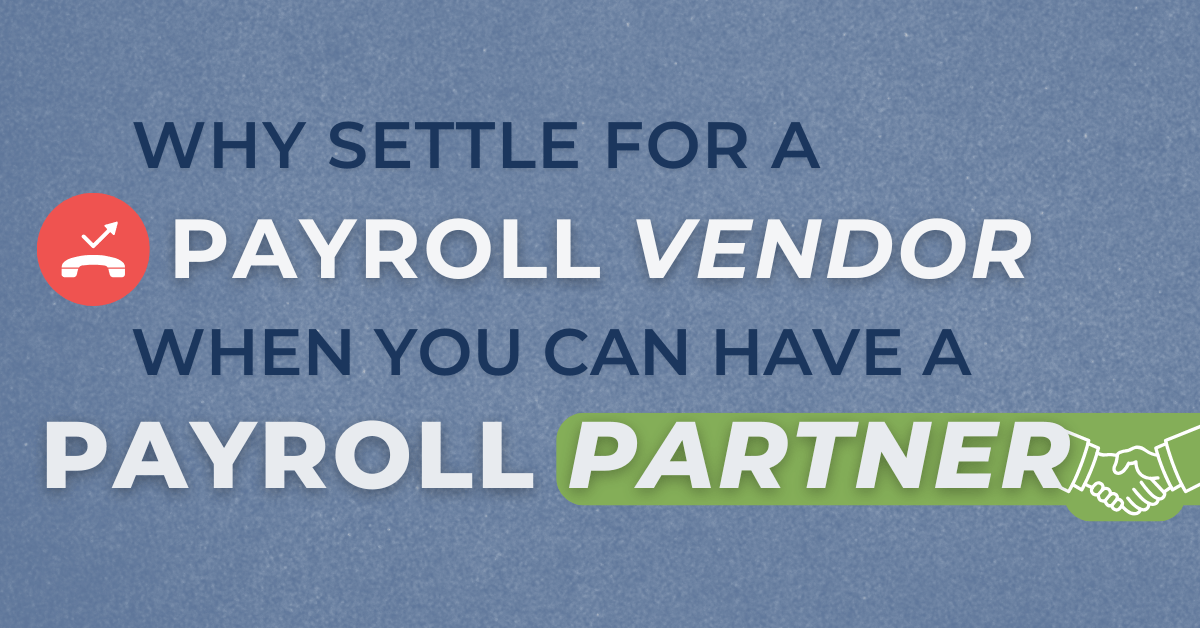Why Settle for a Payroll Vendor When You Can Have a Payroll Partner?
December 31st, 2024 | 3 min. read

Think about the best meal you’ve ever had at a restaurant. Maybe it was a perfectly seared steak, or perhaps it was a rich, decadent chocolate dessert that left you dreaming about it for days. Now, imagine the food was just as incredible, but the service was, well…missing.
How would you feel? Frustrated, right? Even if the meal itself was perfect, the lack of attention would leave a bad taste in your mouth.
That’s the difference between a payroll vendor and a payroll partner.
When it comes to payroll companies there are ones we call “vendors” and others we call “partners.”
A payroll vendor is like that server who disappears after delivering your plate. They might provide exactly what you asked for—payroll software or services—but will they stick around to help you implement it or just leave you hanging? Are they there when you call, or do you get a voicemail? Are they genuinely invested in your ongoing success or just checking off the boxes in your contract?
Alternatively, payroll partners are selling a service that happens to use software to tackle your payroll and HR challenges.
The very definition of a “partner” suggests someone who shares in your efforts and goals. Partnerships are built on relationships—not one-time transactions.
How to Spot the Difference Between a Payroll Vendor and a Payroll Partner
If you're searching for payroll companies on Google, the surface-level differences might not seem obvious. When you are a client, however, having a vendor vs. a partner will make a world of difference in your day-to-day operations.
The following three tips will help you separate the sales-driven vendors from the service-driven partners.
1. Payroll Partners Listen and Learn
A vendor often comes into the conversation ready to sell. They’ll rattle off features and benefits before asking a single question about your business. It’s all about why their solution is the best, not about what you need.
A partner starts by listening. They take the time to ask thoughtful questions about your payroll pain points, your company’s specific needs, and the challenges that have held you back in the past. They focus on understanding your business before jumping into how they can help.
As Theodore Roosevelt said, “Nobody cares how much you know until they know how much you care.” A partner’s first priority is showing they care.
2. Partners Have a Name and a Face
Vendors often deliver the product and then hand you off to an 800 number. That same sales rep who was falling over themselves to get your business will leave you stuck in a customer service queue where no one knows you—or your business.
Partners take a more personal approach. They’re not just selling software; they’re building a relationship. That means you’ll have access to a consistent team who knows your name, understands your goals, and is ready to help whenever you need it.
If you choose a payroll company that views themselves as your partner, your relationship with their team is just getting started. They invest in your long-term success and make your job easier. That's a world of difference from being just another client in a vendor’s system.
3. Partners Are in for the Long Haul
Transitioning to a new payroll system can be a big adjustment, and it doesn’t happen overnight. Vendors might guide you through the initial setup, but after that, their involvement often stops. When you need help running a custom report, troubleshooting an issue, or training a new staff member, you’re left to figure it out alone.
Partners, however, know their work doesn’t end after onboarding. They stick with you, offering ongoing training, resources, and support to make sure you’re never left in the dark.
At Whirks, for example, we offer free weekly 'Office Hours' covering everything from payroll processing and employee self-service to reporting and benefits administration.
In Your Corner
Some things can’t be automated, and great service is one of them.
At Whirks, we believe payroll is about more than just numbers on a page. It’s about building trust, reducing stress, and providing the tools and support that help your business thrive—not just survive. That’s why we’re more than payroll vendors—we’re payroll partners.
If your current payroll company isn’t meeting your expectations, it’s worth asking: are they truly delivering what you need? Are they providing the level of service, expertise, and care your business deserves?
We understand that the right payroll solution goes beyond cost—it’s about reliability, service, and a relationship that adds value to your business.
Take a closer look at how
Whirks compares to the big-box payroll providers and discover the difference that comes with having a true payroll partner in your corner.
Topics: